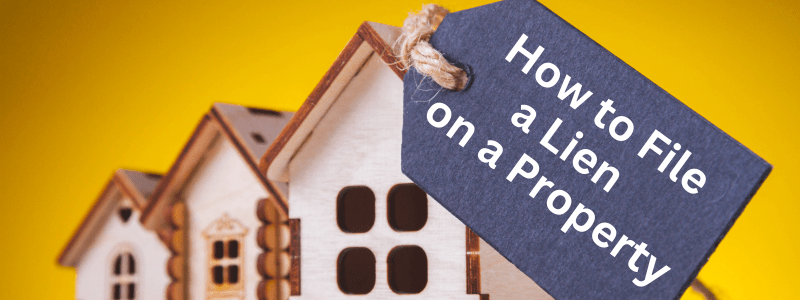Filing a lien on a property can seem daunting, but it’s a crucial step in ensuring you get paid for services rendered or debts owed. Whether you’re a contractor, a lender, or an individual with a court judgment, understanding how to file a lien on a property can help protect your financial interests. In this guide, we’ll walk you through everything you need to know about filing a lien on a property.
Understanding Liens
Definition of a Lien
A lien is a legal claim or right against a property. It is often used as collateral to satisfy a debt. If the debt isn’t paid, the lienholder can enforce the lien to recoup the owed amount.
Types of Liens
- Mechanic’s Lien: Filed by contractors or suppliers who haven’t been paid for work performed on a property.
- Tax Lien: Imposed by the government for unpaid taxes.
- Judgment Lien: Resulting from a court ruling in favor of a creditor.
How Liens Affect Property Ownership
Liens can complicate property ownership by making it difficult to sell or refinance the property until the lien is satisfied. They serve as a public notice that there is a debt associated with the property.
Reasons for Filing a Lien
Unpaid Bills or Services
If you provided services or materials to a property and have not been paid, filing a lien can help ensure you eventually receive payment.
Loan Defaults
Lenders may file a lien if a borrower defaults on a loan, securing the debt with the property.
Court Judgments
Winning a court case for unpaid debts can result in a judgment lien, which formalizes the court’s decision.
Pre-Lien Considerations
Verify the Debt
Before filing a lien, confirm the exact amount owed and that the debt is legitimate.
Attempt to Collect Payment
Attempt to resolve the payment issue directly with the property owner before filing a lien.
Consult Legal Advice
Liens involve legal processes. Consulting with an attorney can help you navigate the complexities and ensure compliance with all legal requirements.
Preparing to File a Lien
Gather Necessary Documentation
Collect all relevant documents such as contracts, invoices, and proof of communication regarding the debt.
Understand State-Specific Requirements
Lien laws vary by state. Familiarize yourself with the specific requirements and deadlines in your jurisdiction.
Timeline Considerations
Ensure you file the lien within the specified time frame to avoid losing your right to claim.
Steps to File a Lien
Step 1: Determine the Right Type of Lien
Identify which type of lien applies to your situation based on the nature of the debt.
Step 2: Prepare the Lien Form
Complete the appropriate lien form, ensuring all information is accurate and complete.
Step 3: File the Lien with the Appropriate Office
Submit the lien form to the designated office, often the county recorder’s office, along with any required fees.
Step 4: Notify the Property Owner
Send a copy of the filed lien to the property owner to inform them of the claim.
Filing a Mechanic’s Lien
Specific Requirements for a Mechanic’s Lien
Mechanic’s liens require detailed documentation of the work performed and materials provided.
Documentation Needed
Gather contracts, invoices, and proof of work completion to support your claim.
Filing Process
File the lien with the county recorder’s office, following state-specific guidelines.
Filing a Tax Lien
Understanding Tax Liens
Tax liens are filed by the government when property taxes remain unpaid.
Steps to File
Typically, the government will handle the filing process, but ensure you understand the implications if you’re a property owner facing a tax lien.
Government Involvement
The government has significant power to enforce tax liens, potentially leading to foreclosure if unpaid.
Filing a Judgment Lien
Court Judgments and Liens
A court judgment for unpaid debts can result in a judgment lien against the debtor’s property.
Process to File a Judgment Lien
Obtain a certified copy of the judgment and file it with the county recorder’s office.
Enforcing the Judgment
A judgment lien can lead to the sale of the property if the debt remains unpaid.
Post-Filing Steps
Confirming the Lien is Recorded
Verify with the county recorder’s office that your lien has been properly recorded.
Monitoring the Status of the Lien
Keep track of the lien’s status and any payments made toward the debt.
Potential Outcomes
The lien may lead to payment of the debt, sale of the property, or further legal action.
Removing a Lien

How to Remove a Lien Once the Debt is Paid
Once the debt is settled, file a lien release form with the county recorder’s office to remove the lien.
Legal Steps to Dispute or Challenge a Lien
If you believe a lien is unjust, you can challenge it in court with the help of an attorney.
Legal Implications
Impact on Credit Score
Liens can significantly damage the property owner’s credit score.
Potential for Foreclosure
Unpaid liens can lead to foreclosure, allowing the lienholder to sell the property to recover the debt.
Legal Defenses Against Liens
Property owners can dispute liens if they believe they are invalid or improperly filed.
Common Mistakes to Avoid
Incorrect Information on Forms
Ensure all information is accurate to avoid having the lien invalidated.
Missing Deadlines
Adhere to all filing deadlines to preserve your lien rights.
Not Following State-Specific Laws
Each state has unique lien laws. Failure to comply can result in losing your lien rights.
Seeking Professional Help
When to Hire an Attorney
Consider hiring an attorney if the lien process becomes too complex or if you’re unsure about legal requirements.
Benefits of Professional Assistance
Professionals can ensure that all paperwork is correctly filed and that all legal requirements are met, providing peace of mind.
Conclusion
Filing a lien on a property is a powerful tool for ensuring you get paid for services rendered or debts owed. By understanding the types of liens, the process for filing, and the legal implications, you can navigate this complex process with confidence. Always remember to verify the debt, meet all deadlines, and consult with legal professionals when necessary. Doing so will help protect your financial interests and enforce your rights effectively.
FAQs
1. What happens if a lien is not paid?
If a lien is not paid, the lienholder can take further legal action, which may include forcing the sale of the property to satisfy the debt.
2. Can a lien be placed without notice?
In most cases, the property owner will be notified when a lien is filed. Specific notification requirements vary by state and lien type.
3. How long does a lien stay on a property?
The duration of a lien can vary depending on the type and state laws. Some liens may expire after a certain period, while others remain until the debt is paid.
4. Can a lien affect selling a property?
Yes, a lien can complicate the sale of a property as it must typically be satisfied or resolved before the property can be transferred to a new owner.
5. What are the costs associated with filing a lien?
Costs can include filing fees, administrative costs, and potentially legal fees if you hire an attorney to assist with the process.
For further insights into effective money management, check out our article on WHAT IS BUDGETING AND WHY IS IT IMPORTANT?

